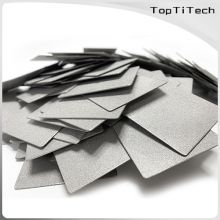1mm Thickness Titanium Sintered Metal Porous Filter Plate
USD $5 - $12 /Piece
Min.Order:5 Pieces
Quick Details View All >
Baoji Yinggao Metal Materials Co., Ltd.
Product Details
1mm Thickness Titanium Sintered Metal Porous Filter Plate
1mm Thickness Titanium Sintered Metal Porous Filter Plate is a type of filter plate made of titanium metal that has undergone a sintering process. In the sintering process, titanium particles are heated to a high temperature and pressed together to form a porous structure. This structure contains small channels or holes that allow fluids or gases to pass through while capturing solid particles or impurities.
The porous structure of the Titanium Sintered Metal Porous Filter Plate is typically created by using a powder metallurgy process. In this process, titanium particles are first compacted into a green body, which is then subjected to a high-temperature sintering process. During sintering, the particles fuse together to form a solid mass with a porous structure.
Titanium is a popular choice for sintered metal filter plates due to its excellent mechanical properties, corrosion resistance, and biocompatibility. The porous structure of the Titanium Sintered Metal Porous Filter Plate can be tailored to achieve specific filtration requirements, such as pore size, pore distribution, and permeability.
Parameter
Material: GR1 titanium powder
Filtration precision:20um
Porosity: 30-40%
Operating temperature: ≤300℃
Diameter: 100mm
Thickness: 1mm
Applications
1. Due to its unique properties, the sintered titanium porous filter plate can be used as a gas diffusion layer in Polymer-Electrolyte-Membrane Fuel Cells (PEMFC), allowing for efficient transfer of reactants to the electrode.
2. The sintered titanium porous filter plate can be assembled as a filter, which is ideal for filtration under high temperatures and corrosive environments. This makes it a suitable material for use in industries such as chemical, pharmaceutical, and oil and gas.
3. The sintered titanium porous filter plate can be coated with Pt and other materials, enabling it to be used as an anode in electrochemical applications, such as fuel cells and electrolyzers.
4. Oil and Gas Industry: In the oil and gas industry, Sintered titanium porous filter plate is used to filter oil and gas during production and transportation. It is also used in the filtration of drilling fluids and completion fluids.
5. Pharmaceutical Industry: In the pharmaceutical industry, Sintered titanium porous filter plate is used to remove bacteria, viruses, and other impurities from liquids. It is also used to filter drugs and to remove particles from drug formulations.
6. Food and Beverage Industry: In the food and beverage industry, Sintered titanium porous filter plate is used to filter liquids, such as wine, beer, and fruit juice, to remove impurities and particles.
Features
1.Strong mechanical strength with the capacity to maintain a consistent filter rating under high pressure.
2.Easy to clean and reuse with a range of filter cleaning options.
3.Resistant to heat and corrosion.
4.Easy to manufacture, weld, punch, shear, or otherwise shape into different sections.
5.A wide range of filter ratings are available.
How does the size and shape of the pores affect the filtration process?
1. Filtration efficiency: The size of the pores determines what size of particles can pass through the filter plate. If the pores are too large, particles that should be removed from the fluid or gas can pass through. Conversely, if the pores are too small, the filter plate can become clogged more quickly and may not allow enough fluid or gas to pass through. Therefore, the size of the pores must be selected based on the size of the particles to be removed and the desired filtration efficiency.
2. Flow rate: The shape of the pores can also affect the flow rate of the fluid or gas through the filter plate. If the pores are irregularly shaped or have a high degree of tortuosity, the flow rate can be reduced due to increased resistance to flow. Conversely, if the pores are more uniform and have a lower degree of tortuosity, the flow rate can be increased.
3. Capacity: The shape and size of the pores can also affect the capacity of the filter plate. If the pores are too small or the filter plate is too dense, it can become clogged more quickly and require more frequent cleaning or replacement. Therefore, the size and shape of the pores must be balanced with the desired capacity of the filter plate.
Contact Supplier

You May Like

New Products
Popular Searches
Recommended Products
Find Similar Products By Category